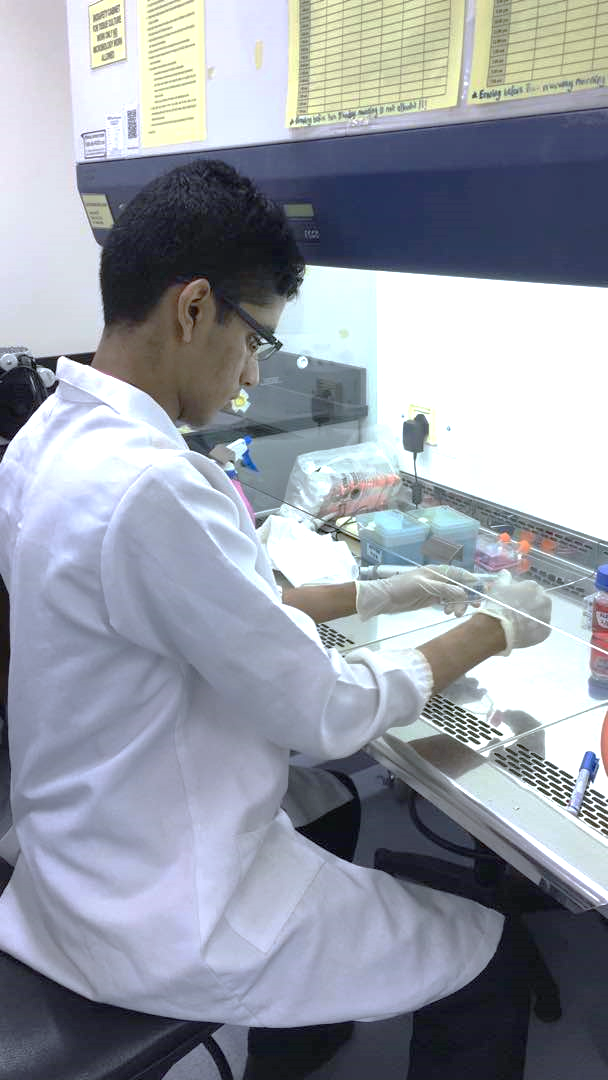Upon completion of a Bachelor’s degree, majority of students will start finding employment or some will be pursue Masters and PhD. How are these students prepared for their professional career? An important part of this is in the industrial training, where a student undertakes a period of training with an organisation. Being actively involved in the industry teaches the student learns about the industrial demands, skill set and work ethics. Many university programmes these days are offering industrial training – a great exposure to learn about the industry.  Let’s hear what Joshua Kuruvilla, IMU‘s 3rd year Medical Biotechnology student, has to say about his experience in industrial training. One of his reasons for taking up Medical Biotechnology was the great potential this programme has in the medical field. After talking to his seniors, lecturers and a Medical Biotechnology lecturer, Joshua decided to pursue Medical Biotechnology. Every student undertaking a degree programme (and their parents) are rightfully concerned about the programme’s ability in setting up the student’s career. Medical Biotechnology programme addresses that with its Internship/Industrial Training carried out in the final semester. Each student including myself has individually (with guidance from educators) reached out to numerous companies/universities, established workplace contacts, undergone interviews and secured internship positions. This system allowed myself to secure a position at Neurology Division of Singapore General Hospital, for which I have the joy of pursuing a Research Internship. The experience thus far has exceeded my expectations! I am able to both expand my skill-set through new work experiences as well as discuss with highly-experienced superiors about my prospective future as a researcher. Additionally, it is exciting to explore other departments and learn from the experiences of those who are pursuing these paths, while holding the comforting flexibility to reconsider my own career path at any point should I wish to.
Let’s hear what Joshua Kuruvilla, IMU‘s 3rd year Medical Biotechnology student, has to say about his experience in industrial training. One of his reasons for taking up Medical Biotechnology was the great potential this programme has in the medical field. After talking to his seniors, lecturers and a Medical Biotechnology lecturer, Joshua decided to pursue Medical Biotechnology. Every student undertaking a degree programme (and their parents) are rightfully concerned about the programme’s ability in setting up the student’s career. Medical Biotechnology programme addresses that with its Internship/Industrial Training carried out in the final semester. Each student including myself has individually (with guidance from educators) reached out to numerous companies/universities, established workplace contacts, undergone interviews and secured internship positions. This system allowed myself to secure a position at Neurology Division of Singapore General Hospital, for which I have the joy of pursuing a Research Internship. The experience thus far has exceeded my expectations! I am able to both expand my skill-set through new work experiences as well as discuss with highly-experienced superiors about my prospective future as a researcher. Additionally, it is exciting to explore other departments and learn from the experiences of those who are pursuing these paths, while holding the comforting flexibility to reconsider my own career path at any point should I wish to.  For Joshua, the hands on experiences through practical sessions and laboratory work is a great way to develop his skills in the field of forensics, tissue culture, pharmacology, and medicine. Practices in bioinformatics for programming and molecular design and training in writing research articles are also useful. Although it was difficult in coping with the new syllabus and multiple assignments initially, Joshua overcame that with help from peers, seniors and lecturers. In addition, the academic mentor’s support and guidance helped him in many ways of being an independent learner. The theory learned has helped Joshua tremendously in his final year project. Basic lab techniques such as handling microscope, staining and etc learned during Foundation in Science (FiS) year helped him to explore more. Basic practice on report writing, citation of references, use scientific journal has been useful for Joshua. Opportunities talking to lecturers, lab demonstrators, and seniors are also a boost for Joshua to build his experience as it also gave him a clearer picture of his career pathway.
For Joshua, the hands on experiences through practical sessions and laboratory work is a great way to develop his skills in the field of forensics, tissue culture, pharmacology, and medicine. Practices in bioinformatics for programming and molecular design and training in writing research articles are also useful. Although it was difficult in coping with the new syllabus and multiple assignments initially, Joshua overcame that with help from peers, seniors and lecturers. In addition, the academic mentor’s support and guidance helped him in many ways of being an independent learner. The theory learned has helped Joshua tremendously in his final year project. Basic lab techniques such as handling microscope, staining and etc learned during Foundation in Science (FiS) year helped him to explore more. Basic practice on report writing, citation of references, use scientific journal has been useful for Joshua. Opportunities talking to lecturers, lab demonstrators, and seniors are also a boost for Joshua to build his experience as it also gave him a clearer picture of his career pathway.
His advice to FiS students is “Grab opportunities that come along the way and speak to lecturers and seniors for a clearer career pathway”. He also encourages students to expose themselves to reading many materials and practice on improving their writing skills.

